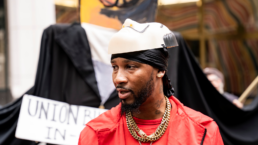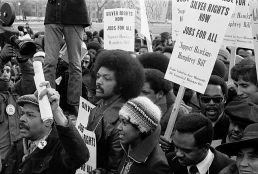Black labor organizers have long recognized that better conditions for Black and brown workers result in better conditions for everyone.
By Anna Gifty Opoku-Agyeman and Katie Camacho Orona, Teen Vogue
On April 1, 2022, Jeff Bezos received some news that he wished was an April Fools’ joke: Amazon warehouse workers in Staten Island won their vote to create a union, beating the odds and making history in the process. The face of the “Shut Down Amazon” movement, a working-class Black man named Christian Smalls, is building on the legacy of Black labor leaders whose efforts define generations.
While there are countless articles profiling Smalls, few have acknowledged the long history of Black labor leaders taking the helm of workers’ rights movements. Smalls, who was subjected to a smear campaign by Amazon and dismissed as “not smart or articulate” by company leaders, is reminiscent of a lineage of Black American labor organizers and scholars who have always recognized the liberation of all workers begins with the Black worker.

African Americans have participated in labor activity since before the Civil War, as documented by the National Archives. Like many American institutions in the century following that war, organized labor often excluded or marginalized Black people, despite workers’ shared interest in advocating for better conditions, especially in occupations that failed to dignify their labor.
During The Great Migration of 1916 to 1960, millions of African Americans relocated from the South to the Northeast and Midwest in pursuit of employment in industries including steel, automotive, shipbuilding, and meatpacking. Yet these gains occurred alongside the government’s refusal to extend rights to many workers of color. In 1938, Congress passed the Fair Labor Standards Act (FLSA), a landmark piece of legislation enshrining protections for workers, yet it excluded domestic, agricultural, and tipped workers, purposefully denying many Black and brown people the same rights and protections given to white workers. Additionally, according to the National Employment Law Project, “Nearly half of all Black men, Mexican American men, and Native American men and women…were excluded from Social Security, unemployment insurance, and the right to organize” in the National Labor Relations Act of 1935. The effects of this exclusion fell disproportionately on Black women because of their concentration in agriculture and domestic work. Perhaps this is why the first Black woman economist in the U.S., Dr. Sadie Tanner Mossell Alexander, focused her dissertation on the economic outcomes of families that participated in The Great Migration. She also advocated for recentering the economy on Black women workers as one way to promote economic growth and progress for the Black community.
Recent Posts
‘The Siege Must Be Broken’: Countries Called to Ship Fuel to Cuba After Trump Tariffs Struck Down
February 21, 2026
Take Action Now The US Supreme Court’s ruling “implies that Trump’s recent order imposing tariffs on countries selling oil to Cuba exceeds the…
Elite Depravity in Imperial Decline, A Zero Hour Conversation With Richard Wolff
February 20, 2026
Take Action Now “The system self-selects for psychopathy… the most sociopathically obsessive competitor and accumulator of personal power and…
Economics of Health For All: The Plan to Put Health at the Heart of the Global Economy
February 20, 2026
Take Action Now At the World Health Assembly in May, member states may endorse an unprecedented strategy declaring that health is not a cost – but…
The Left Owes a Lot to Jesse Jackson
February 19, 2026
Take Action Now As a movement builder, spokesperson, and candidate for the presidency, Jesse Jackson’s accomplishments were massive. He was one of…




